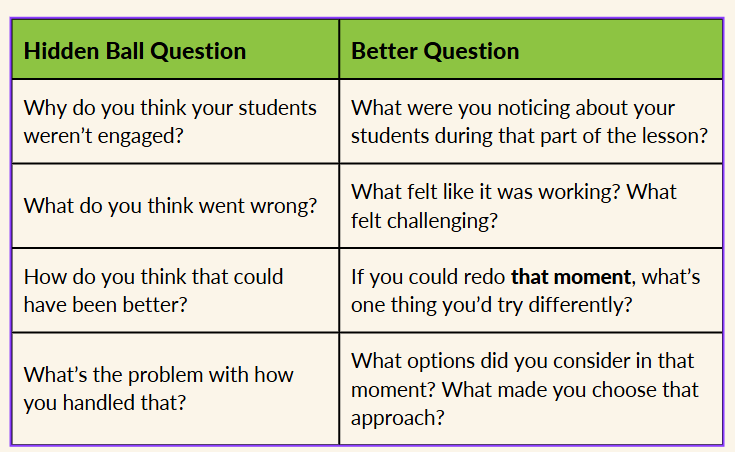You ever had a leader ask you a question that felt more like a trap than an invitation? Something like:
“What do you think might have gone wrong with that lesson?"
Or worse:
"Why do you think your students weren’t engaged?"
These kinds of questions are the coaching equivalent of a pop quiz—the kind where the teacher is just waiting for you to say the wrong thing so they can pounce. They hide the ball. The coach already knows (or thinks they know) the answer, and instead of being direct, they’re making you guess what’s in their head.
Coaching is not a pop quiz. It’s a conversation. A good question doesn’t test someone—it unlocks their thinking. It doesn’t corner them—it opens up possibilities.
Hiding the Ball vs. Putting It in Play
Let’s look at a few examples.
The problem with hidden-ball questions is that they trigger defensiveness, second-guessing, and frustration. They make coaching feel like an interrogation. When a coach plays keep-away with their thinking, the person being coached isn’t actually reflecting—they’re just trying to get the answer “right.”
When Do I Ask vs. When Do I Tell?
Coaching isn't just about asking great questions—it’s also about knowing when to stop asking and just say the thing. Not every moment is a Socratic dialogue.
Ask when:
You want to surface a teacher’s thinking.
The goal is reflection, problem-solving, or learning.
The teacher has the knowledge but needs help making connections.
You genuinely don’t know something and are curious.
Tell when:
There’s an urgent problem that needs immediate action.
The teacher doesn’t have the knowledge yet (especially newer teachers).
Clarity matters more than discovery (e.g., “Hey, your students are off-task because they don’t have a clear direction.”).
“The goal of coaching is not just to prompt thinking but to prompt improvement.” - Doug Lemov
If a teacher is struggling with classroom management and has no idea what to do, asking endless reflection questions isn’t helpful. Sometimes, you just have to put the ball in their hands and show them how to dribble.
What’s the Purpose of Coaching Questions?
Every question you ask should have a purpose. If you’re just firing off questions because that’s what a coach is supposed to do, you’re probably wasting time.
Good coaching questions serve one (or more) of these functions:
To uncover thinking – "What was your goal for that part of the lesson?"
To build self-awareness – "What patterns have you noticed in student engagement?"
To encourage problem-solving – "What are some strategies you’ve tried? What else might work?"
To focus on impact – "What did students actually do and say in that moment?"
To guide next steps – "What’s one small adjustment you’d like to test next time?"
A question should empower the teacher, not make them feel like they’re in trouble.
“The questions we ask shape the culture we create.” - Elena Aguilar
Are You Playing Keep-Away?
Think about the last coaching conversation you had. Did your questions feel open and inviting, or were they a little too much like leading the witness?
Better yet, what’s a coaching question that completely changed how you or someone you worked with thought about a challenge? Drop it in the comments—let’s build a bank of great ones.







